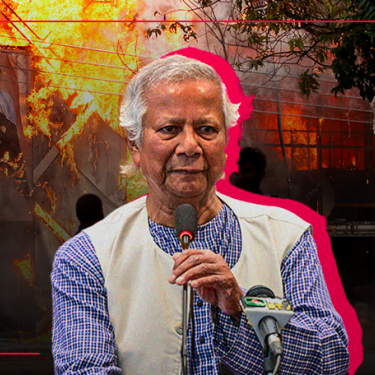Bangladesh’s interim government must urgently protect journalists against growing attacks

Two journalists were arrested on the night of 20 August at Dhaka airport as they tried to flee the country, fearing reprisals for their work. Their names appear on a list of media professionals accused of collusion with the former government of Sheikh Hasina. In this phase of political transition, violence against journalists and the media has increased. Reporters Without Borders (RSF) calls on the interim authorities to protect all journalists.
Journalists Farzana Rupa and Shakil Ahmed, who is Rupa’s husband, were stopped by immigration officials at Dhaka’s Hazrat Shahjalal international airport at around 5:30 a.m. on 21 August as they tried to fly to France because they feared reprisals in connection with their work.
Both worked for Ekattor TV, a privately-owned TV channel that supported the recently ousted Hasina government, and both figure on an unofficial list of 235 media professionals accused of supporting the former government, that is circulating online. Rupa has also worked for the French international TV news channel France 24.
A few hours after their arrest, Rupa and Ahmed were transferred to a police station in the capital. Facing particularly serious charges, including ‘incitement to violence’, they were remanded in custody by a court on 22 August. In the current wave of violence and hostility towards the media and media personnel, they are the first journalists to be the subject of judicial proceedings since an interim government led by economist Muhammad Yunus was formed on 8 August.
Journalists on the list of media personnel accused of colluding with the Hasina government are in particular danger in the current security chaos. They include editors of the independent dailies Prothom Alo and Daily Star, RSF’s correspondent, and correspondents of such international media as the Associated Press and Deutsche Welle.
Since the start of the month, the media have been the targets of at least two violent raids by unidentified protesters, one against a media company and one against a local press club, and more than twenty journalists have been attacked.
“The repeated violence against journalists in recent weeks is unacceptable. Permitting attacks on reporters and allowing news media to be ransacked would be tantamount to tolerating a climate of terror after the 15-year clampdown on the media imposed by the former prime minister’s government. We call on the interim authorities to urgently protect them from both protesters and judicial reprisals. The prosecution of journalists Farzana Rupa and Shakil Ahmed is very disturbing. They must be released and protected. At the very least, the authorities must guarantee them full justice and must avoid repeating the methods used by the former government against media professionals.
Surge in violence against journalists
After the violent crackdown on anti-Hasina protests in which hundreds were killed, including five journalists by the live rounds used by police, media professionals are now being targeted by protesters who, for the most part, are unidentified or politically unaffiliated.
On 19 August, a group of protesters armed with sticks attacked the Dhaka headquarters of the East-West Media group, which houses the Kaler Kanto and Bangladesh Pratidin newspapers, the English-language Daily Sun, the Bangalnews24.com news agency, the News24 and T-Sports TV channels, and Capital FM radio.
Two Somoy TV journalists, reporter Avijeet Banik Apu and cameraman Naushad Ahmed Chowdhury, were attacked by a group of student protesters while covering a demonstration outside a secondary school in the northeastern city of Sylhet on 17 August.
Two visiting foreign reporters, including an Indian journalist working for France 24, were attacked by a crowd of demonstrators in Dhaka on 15 August and were forced to delete video footage from their cameras, one of them told RSF.
Moniruzzaman Monir, the Desh Rupantor daily newspaper’s correspondent in the central city of Narsingdi, sustained a gunshot injury during an attack by a group of assailants armed with machetes at the railway station on 13 August that was prompted by an article by Monir about recent looting. In the south-eastern city of Chattogram, 20 journalists were injured during an attack on the local press club on 5 August.
Persecuted under Sheikh Hasina, Bangladesh’s journalists saw their country fall another two places in RSF’s 2024 World Press Freedom Index. It is now ranked 165th out of 180 countries.
